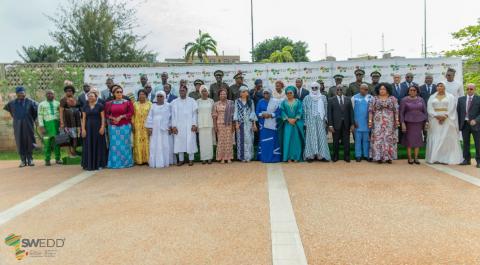
Ten years after the launch of the regional SWEDD project, the 8th ordinary session of the Regional Steering Committee (RSC) concluded on 4 July in Cotonou, marking a decisive turning point for the future of girls and women in Sub-Saharan Africa.
Organised under the leadership of the West African Health Organisation (WAHO), with the support of the World Bank and the United Nations Population Fund (UNFPA), this strategic session provided an opportunity to assess the results achieved in 2024, validate the action plans for 2025, and renew the project's governance bodies.
The Vice-President of the Republic of Benin, Mrs Mariam Chabi TALATA, delivered the official opening speech of the 8th ordinary session of the Regional Steering Committee of the SWEDD+ project. She praised the strong regional mobilisation around this major initiative for women's empowerment and the sustainable transformation of African societies. She highlighted the tangible results achieved since 2015, particularly in girls’ education, the reduction of early marriages, and access to reproductive health.
Emphasising the reforms undertaken in Benin under the leadership of President Patrice Talon, she called for the institutionalisation of the project’s achievements, the integration of innovations into public policy, and for SWEDD+ to be positioned as a driver for sustainable development. She urged participants to act with commitment to meet the expectations of the people, stating: “The sustainable development of our nations will depend on the involvement, inclusion and participation of women and girls in the governance of our countries. This requires from each of us a deep awareness of the stakes, leadership, solidarity, determination and efficiency.” She concluded by expressing her gratitude to the technical and financial partners for their continued support.
The World Bank Resident Representative in Benin, Dr Nestor COFFI, recalled in his address that “SWEDD+ is much more than a project; it embodies a collective commitment to the empowerment of women and girls.” He stressed that no lasting change can be achieved without the involvement of the entire society, including men, boys and decision-makers at all levels.
Dr COFFI also issued a strong call to ministers and heads of state, stating that only an ambitious regional coordination, based on policy harmonisation, innovation sharing and aligned investments, will make it possible to maximise the project’s impact and deliver on its promise.
The UNFPA Regional Director for West and Central Africa, Dr Sennen HOUNTON, welcomed the growing leadership of the States in the governance of the SWEDD+ project, emphasising the importance of national ownership to ensure the initiative’s success. He recalled that although the project was born from a partnership, its sustainability now depends on the sovereign commitment of countries to invest in human capital, especially that of girls and women. “When national priorities guide action, as is the case today with SWEDD+, results become more effective, more sustainable, and more tangible,” he said. He reiterated UNFPA’s commitment to supporting this momentum, convinced that national ownership is the key to the project’s future.
In her welcome address, the Minister of Social Affairs and Microfinance of Benin, Mrs Véronique TOGNIFODÉ, who also serves as Vice-President of the Regional Steering Committee, praised the strong mobilisation of the delegations and the quality of technical exchanges during the two days of preparatory work in Cotonou. She expressed deep appreciation to Dr Melchior AÏSSI, Director General of the West African Health Organisation (WAHO), whom she described as the true driving force behind the event, underlining that his unwavering commitment and leadership were instrumental to the organisation and success of the 8th ordinary session of the SWEDD+ CRP.
At the end of the ministerial session, Benin was unanimously appointed to assume the Presidency of the SWEDD+ Regional Steering Committee for a one-year term.
With over 2.7 million girls and women reached over the past ten years, the project has demonstrated the effectiveness of a multisectoral, coordinated and country-led approach. Whether keeping girls in school, providing vocational training, strengthening life skills, or engaging community leaders, SWEDD+ has proven its worth.
The entry of The Gambia, Senegal and Togo into the initiative brought renewed momentum, expanding its geographical reach and reinforcing regional solidarity in the face of shared challenges such as early marriage, school dropout, and economic vulnerability among young women.
The Cotonou session concluded on a note of hope and mobilisation. Member States reaffirmed their ambition: to make the empowerment of adolescent girls a driver of sustainable development. The message is clear: the future of Africa lies in its daughters. The time to act is now.
